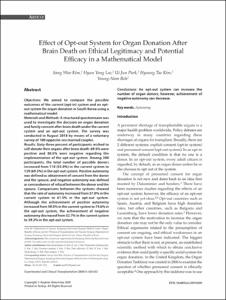Effect of Opt-out System for Organ Donation After Brain Death on Ethical Legitimacy and Potential Efficacy in a Mathematical Model
- Alternative Author(s)
- Lee, Hyun Yong; Park, Ui Jun; Kim, Hyoung Tae; Roh, Young Nam
- Journal Title
- Experimental and clinical transplantation
- ISSN
- 2146-8427
- Issued Date
- 2020
- Keyword
- Autonomy
- Abstract
- Objectives:
We aimed to compare the possible outcomes of the current (opt-in) system and an opt-out system for organ donation in South Korea using a mathematical model.
Materials and methods:
A structured questionnaire was used to investigate the decision on organ donation and family consent after brain death under the current system and an opt-out system. The survey was conducted in August 2018 by means of a voluntary survey of 100 opposite-sex married couples.
Results:
Sixty-three percent of participants wished to self-donate their organs after brain death: 69.5% were positive and 30.5% were negative regarding the implementation of the opt-out system. Among 200 participants, the total number of possible donors increased from 110 (55.0%) in the current system to 139 (69.5%) in the opt-out system. Positive autonomy was defined as obtainment of consent from the donor and the spouse, and negative autonomy was defined as concordaence of refusal between the donor and the spouse. Comparisons between the systems showed that the rate of autonomy increased from 57.0% in the current system to 61.5% in the opt-out system. Although the achievement of positive autonomy increased from 59.5% in the current system to 74.6% in the opt-out system, the achievement of negative autonomy decreased from 52.7% in the current system to 39.2% in the opt-out system.
Conclusions:
An opt-out system can increase the number of organ donors; however, achievement of negative autonomy can decrease.
- Department
- Dept. of Surgery (외과학)
- Publisher
- School of Medicine (의과대학)
- Citation
- Sang Woo Kim et al. (2020). Effect of Opt-out System for Organ Donation After Brain Death on Ethical Legitimacy and Potential Efficacy in a Mathematical Model. Experimental and clinical transplantation, 18(5), 626–632. doi: 10.6002/ect.2019.0420
- Type
- Article
- ISSN
- 2146-8427
- Appears in Collections:
- 1. School of Medicine (의과대학) > Dept. of Surgery (외과학)
- 파일 목록
-
-
Download
 oak-2020-0307.pdf
기타 데이터 / 715.82 kB / Adobe PDF
oak-2020-0307.pdf
기타 데이터 / 715.82 kB / Adobe PDF
-
Items in Repository are protected by copyright, with all rights reserved, unless otherwise indicated.